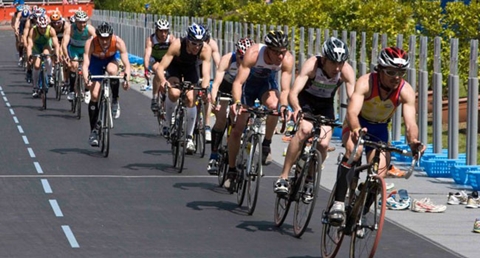How to Raise Testosterone Levels and Production Naturally
The purpose of this article is to (i) educate you on the role testosterone plays in men's health and (ii) provide information to help you naturally keep your testosterone levels up so you will be stronger, reduce excess body fat, live longer and maintain a high libido, (iii) help you boost low testosterone levels without testosterone supplements, and (iv) help you be a better athlete!!
What is Testosterone?
Testosterone is the hormone that gives men their male characteristics. Testosterone give men their a deep voice, higher muscle mass, facial and torso hair, and aggressive behaviour.
Testosterone also is the hormone that controls sexual function in men. Testosterone is know for its ability to increase libido. Testosterone also plays a key role in keeping men's bones dense and strong and in building muscle mass. Low testosterone levels contribute to low sperm count. See How to Increase Sperm Count Naturally
When do Testosterone Levels Begin to Decrease?
Testosterone levels are at the highest during puberty and adolescence when boys physically change to young men. However, testosterone levels begin declining after the age of 30. This decline leads to many changes in your body.
The normal level of testosterone in your bloodstream is between 350 and 1,000 nanograms per deciliter (ng/dl).Testosterone begins declining after the age of 30 and research indicates that in an average men generally lose 1% of testosterone a year. This decline is testosterone levels is gradual but on average by the time you reach 40 you have already lost 10% of this hormone and you can feel the effects more sharply.
Testosterone levels in American men have been declining steadily over the past two decades, according to a 2006 study in the Journal of Clinical Endocrinology and Metabolism.
What are the Results or Symptoms of Low Testosterone Levels?
Decreasing testosterone levels can result in:
- -Loss of lean muscle
- -Weight gain specially around the waistline
- -Decline in libido and erectile dysfunction
- -Decline in energy levels
- -Irritability
- -Depression, mood swings
- -Decreased bone density which makes your bones more susceptible to fractures etc -Testosterone levels in the low range (a blood serum score below 350 ng/dl) may increase your chances of dying of a heart attack.
- -Low testosterone seems to predict increased risk of total mortality in cardiovascular disease as well as cancer," said Dr. Kay-Tee Khaw, professor of clinical gerontology at the University of Cambridge School of Clinical Medicine in Britain.
There is considerable evidence of an association with depressive symptoms and low testosterone levels in men. See Amiaz, Kanayama, Pope, Seidman “Testosterone Supplementation for Depressed Men: Current Research and Suggested Treatment Guidelines” Experimental and Clinical Psychopharmacology 2007, Vol. 15, No. 6, pages 529-538. See How to Treat Depression Naturally. High testosterone levels are associated with better cardiovascular health.
Lifestyle tips to Increase Testosterone Production Naturally
These lifestyle factors play a key role in determining and increasing testosterone levels:
1. SLEEP. Have a routine of regularly getting enough sleep. Lack of good sleep is probably the number one reason for compromised testosterone levels. Full sleep enables the body to repair and recovery. The highest release of hormones into our blood stream, including Testosterone, occurs while we sleep. See here for 12 Tips to Good Sleep.
2. MAINTAIN A HEALHTY DIET AND EAT FOODS HIGH IN ZINC and MONOUNSATURATED FATS. Eating nuritious foods in general and foots high in zinc and monounsaturated fats, in particular, raise testosterone levels. See A Diet to Boost Testosterone Production
AVOID SOY . . . Soy lowers testosterone levels! See Soy Lowers Men's Testosterone Levels
3. EXERCISE. Regular sustained (at least an hour) of brisk aerobic exercise three times a week will help raise your testosterone levels. Daily is better. Cycling, Hiking, walking, Swimming, Running are all good aerobic exercises to increase testosterone levels. This aerobic exercise should be at a level to increase your heart rate. Be part of a sports team!
4. LIFT WEIGHTS. Weight lifting is already known for its hormone releasing potential, but in order to really get the maximum benefit, try turning up the intensity. One way to accomplish this is by doing active recovery in between sets. You can do jump ropes, step-ups, seated balances, box jumps, jogging around the gym floor or power skips. What's important is to keep your heart rate up! Lifting weights can increase muscle mass and testosterone levels.
5.RECOVER FROM WORKOUTS. Recovery is an essential component of weight training and long aerobic exercise. If you overtrain -- meaning you don't allow your body to recuperate adequately between training sessions -- your circulating testosterone levels can plunge by as much as 40 percent, according to a study at the University of North Carolina.
6. COMPETE. Competition raises the sense of mission, sharpens the focus, increases metabolism and with it testosterone production.
7. KEEP ARTERIES CLEAR. The clearer the arteries, the better the body is able to deliver testosterone via the blood. Clear arteries goes a long way toward a better erection. See here for How to Naturally Maintain Clear Arteries.
8. AVOID NEGATIVE STRESS. Too much stress (negative stress as opposed to challenge)or worry depresses the immune system and reduces testosterone production.
9. HAVE CHALLENGE. Challenge and adventure, either physical, mental or emotional is a good way to get the juices flowing, including testosterone.
10. HAVE MORNING SEX. German scientists found that simply having an erection causes your circulating testosterone to rise significantly -- and having one in the morning can goose your natural post-dawn testosterone surge. Frequent sex is a good idea, is healthy and can boost testosterone. From a physiological perspective, having sex increases testosterone levels, which promote libido, strength, energy, aggression and competitiveness.
There is a big discussion about whether too frequent ejaculation is healthy in the long term. There is compelling authority that ejaculation control and discipline improves men's health, vigor, longevity and sexual vitality.
A research published by the US National Library of Medicine and the National Institutes of Health found that after 7 days of not ejaculating, men’s testosterone levels reached 145.7% of the baseline. The interesting thing is that they didn’t observe significant fluctuations from the baseline on days 2 through 5. The research also showed that the peak levels were at day 7. See Ejaculation Frequency for Optimum Men's Health and Longevity!
11. DON'T DRINK MORE THAN 3 ALCOHOLIC DRINKS PER DAY. Alcohol affects the endocrine system, causing your testes to stop producing the male hormone.
12. DON'T SMOKE. There are studies that have shown that smoking can reduce testosterone levels and, according to a recent study by the Boston University School of Medicne, decrease genital size. In the same way that smoking has been shown to damage the ability of the blood vessels in the lungs and heart to retain elasticity, the vessels of the penis may be equally affected. The blood vessels of the penis are much smaller than those of the heart so constriction in this area may have relatively more severe consequences.
13. MANAGE WEIGHT. Obese men had a 60 percent higher chance of having a low volume of semen, according to Ghiyath Shayeb. They also had a 40 percent higher chance of having some sperm abnormalities. Ghiyath Shayeb of the University of Aberdeen presented these research results at a meeting of the European Society of Human Reproduction and Embryology.
14. SUNSHINE. Recent research has found that Vitamin D increases hormone levels in men. The male reproductive tissue also have Vitamin D receptors. See also Natural Sources of Vitamin D!
AVOID SOY . . . Soy lowers testosterone levels! See Soy Lowers Men's Testosterone Levels
More about Ralph Teller. See Ralph's 1Vigor Log Calendar.






